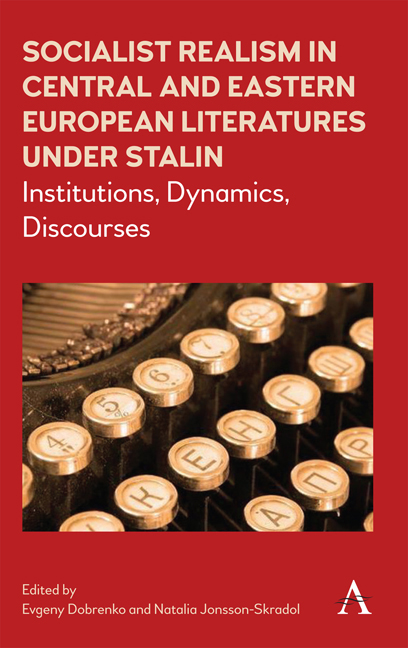 Socialist Realism in Central and Eastern European Literatures under Stalin
Socialist Realism in Central and Eastern European Literatures under Stalin Book contents
- Frontmatter
- Contents
- Acknowledgements
- Introduction
- Part 1 Institutions
- Part 2 Dynamics
- Part 3 Discourses
- 15 Introducing Socialist Realism in Hungary, 1945– 51: How Politics Made Aesthetics
- 16 When Writers Turn against Themselves: The Soviet Model and the Bulgarian Experience, 1946–56
- 17 Big Brother's Gravity: East European Literature in the Mirror of Soviet ‘Thick Journals’ in the Late 1940s
- 18 The Coming One: Prolegomena to the Positive Hero of Czech Socialist Realism as a Transforming and Transformed Subject
- 19 Will Freedom Sing as Beautifully as Captives Sang about It? Reshaping the Croatian Canon, 1945–55
- 20 The Salon in the Camp: Friendship Societies and the Literary Public Sphere in the SBZ and Early GDR
- Conclusion
- List of Contributors
- Index
15 - Introducing Socialist Realism in Hungary, 1945– 51: How Politics Made Aesthetics
from Part 3 - Discourses
Published online by Cambridge University Press: 10 May 2018
- Frontmatter
- Contents
- Acknowledgements
- Introduction
- Part 1 Institutions
- Part 2 Dynamics
- Part 3 Discourses
- 15 Introducing Socialist Realism in Hungary, 1945– 51: How Politics Made Aesthetics
- 16 When Writers Turn against Themselves: The Soviet Model and the Bulgarian Experience, 1946–56
- 17 Big Brother's Gravity: East European Literature in the Mirror of Soviet ‘Thick Journals’ in the Late 1940s
- 18 The Coming One: Prolegomena to the Positive Hero of Czech Socialist Realism as a Transforming and Transformed Subject
- 19 Will Freedom Sing as Beautifully as Captives Sang about It? Reshaping the Croatian Canon, 1945–55
- 20 The Salon in the Camp: Friendship Societies and the Literary Public Sphere in the SBZ and Early GDR
- Conclusion
- List of Contributors
- Index
Summary
In the national elections that took place in Hungary in November 1945, the Hungarian Communist Party (HCP) was in for a surprise: it lost. It lost, even though its leaders, most of whom had returned home after a prolonged stay in the Soviet Union, were convinced that they would easily score a victory over their political rivals. But it was not meant to be, and the HCP had to prepare for a longer struggle for the establishment of socialism than it had hoped. This chapter looks at the repercussions of this failure on the Hungarian cultural and, more specifically, literary sphere, which came to be characterized in the late 1940s by quite a strong tension between two opposing tendencies. On the one hand, it was managed by communist authorities (partly from Moscow), but on the other, it was to remain open to a multiplicity of approaches, opinions and creative methods so as to ensure at least an illusion of democracy both for the benefit of Western neighbours and for some of the local intellectuals. The Hungarian case offers an intriguing example of how socialist realism could be introduced in an atmosphere of supposed pluralism. Of particular interest in this context is the figure of György Lukács (1885– 1971) who at the time, as the analysis below will show, played a key role in outlining the theoretical and practical framework for many of the strategic decisions related to the development of the cultural sphere in Hungary. Lukács's assistance in this process deserves particular attention, for it reveals that the philosopher fulfilled rather different roles in the various countries he was living in. While in the Soviet Union he embodied in many respects a reflective Marxist alternative to inflexible dogmatism, in post- war Hungary he greatly contributed to a hegemonic cultural politics that seriously restricted, sometimes by coercive measures, cultural exchange.
‘Freedom to Writers!’
As one might expect, in the spring of 1945 cultural life in Hungary was far from vibrant. Accordingly, at the initial stage, cultural issues were considered by the HCP to be secondary to more significant affairs in the political arena.
- Type
- Chapter
- Information
- Socialist Realism in Central and Eastern European Literatures under StalinInstitutions, Dynamics, Discourses, pp. 237 - 260Publisher: Anthem PressPrint publication year: 2018


